In the ever-evolving digital landscape, choosing the right web hosting service is paramount to the online success of businesses and individuals alike. Affordable web hosting has become the holy grail for many, balancing cost-effectiveness with high-quality service offering. However, the conundrum of discerning an authentically affordable service from a parade of cheap-yet-underperforming providers can be daunting. This discourse aims to unravel the complexities around picking affordable web hosting services, without compromising on uptime reliability, customer support, security features, and scalability. Moreover, it takes a close look at the potential pitfalls that may follow with chasing low-cost services and how these may ultimately affect the quality of one’s web experience.
Key Considerations in Choosing Affordable Web Hosting Services
Top Considerations for Choosing the Best Value-Packed Web Hosting Services
In the ever-evolving tech landscape, picking the right web hosting service can make or break an online business venture. Just as a well-constructed building requires a sturdy foundation, an online platform thrives on the reliability and capabilities of its web hosting provider. Consider these crucial factors when seeking affordable web hosting services.
-
Uptime and Reliability: First on the list is the uptime guarantee. In the digital world, every minute of downtime is a potential loss of audience, reputation, and revenue. Aim for a web host that guarantees an uptime of 99.99%. The reliability and stability of the site should never be compromised – not even for a budget-friendly choice.
-
Bandwidth and Disk space: Bandwidth and disk space drive the performance of the website. The former refers to the volume of data transferred between the website and users, while the latter involves the storage space needed for site’s data. In the quest for affordable solutions, ensure that the hosting provider offers scalable plans that can adapt with the evolving demands of the business.
-
Security: In the 21st century, cybercrime is a reality that no online platform can afford to overlook. A robust web hosting service should provide comprehensive security features, including SSL certificates, firewall protections, DDoS protection, and regular backups. All these functioning together will safeguard sensitive data from potential breaches.
-
Technical Support: Efficient customer service is a lifesaver when confronting technical glitches. A responsive and knowledgeable support team, working 24/7, is definitely a cornerstone when deciding between web hosting providers. Don’t settle for a service that offers less – technical issues don’t adhere to 9 to 5 schedules.
-
Pricing: Last but certainly not least, pricing is a significant factor when choosing an affordable web hosting service. Yet, it shouldn’t be the sole determinant. Evaluate the price in relation to the services offered. Sometimes, paying a tad more for extra security or better performance may save a lot of headaches down the line.
In the landscape of web hosting, affordable does not necessarily mean compromising on quality or settling for less. It’s about recognizing the balance needed between cost and functionality, and making a choice that aligns with the business strategy. By considering these factors, picking the right web hosting service can lead to a fruitful online presence that ticks all boxes and doesn’t break the bank. Remember, the cheapest option is not always the wisest, especially when the virtual presence of a business is at stake. Make the decision based on qualitative aspects and watch the investment pay off in the long run.

Analyzing Top Affordable Web Hosting Providers
Comparing Top Affordable Web Hosting Providers: Interface, Features, and Scalability
When examining the web-hosting industry, it’s easy to get overwhelmed by numerous options, technical jargon, and varying price points. Beyond uptime, reliability, bandwidth, disk space, security, technical support, and pricing – the cornerstone elements for choosing a hosting provider – there are features to consider that cater specifically to tech enthusiasts. Let’s put three widely known, yet affordable, hosting providers under the microscope: Bluehost, HostGator, and SiteGround.
Starting with the interface, tech enthusiasts appreciate when hosting providers supply intuitive control panels. Bluehost is perhaps the frontrunner here, offering a clean and user-friendly interface. Designed for easy navigation, it helps users move between features, enabling the admin tasks execution effortlessly. HostGator follows closely with its cPanel-based layout, allowing its users to manage their websites, domains, and email along with a variety of features. SiteGround, though no slouch, falls a little behind in its interface presentation, but nonetheless, it’s visually appealing and well organized with a site management central hub.
Core to every host provider are integrated features. HostGator sets itself apart with a build-in free website builder, along with an automatic backup and restore tool. Bluehost also scores high with a vast array of plugins and access to the MOJO marketplace, where you can find additional apps and services.
SiteGround, however, differentiates from the pack with advanced features like its in-house built SuperCacher, an effective speed optimization tool helpful for dealing with high website traffic. Not just that, free automatic updates, daily backups, and a CDN with Cloudflare further bolster its value.
As a tech enthusiast, you know how vital scalability is, especially if the user base grows or traffic increases. Bluehost levels the field with its range of hosting services, including shared hosting, VPS, and dedicated server hosting, which allow for seamless upgrades as a website grows. HostGator also impresses with similar scalability options, allowing room for growth without severe service disruptions.
SiteGround also offers scalable solutions, but the distinction lies in its cloud-hosting plans, a feature most enthusiasts find appealing. Users can increase CPU and RAM as needed, providing an entirely flexible and customizable resource allocation, a valuable option for growing websites and businesses.
In conclusion, Bluehost, HostGator, and SiteGround, with their own unique offerings, stack up quite well against each other, showing why they are seen as industry leaders. As a tech enthusiast, your choice would depend on the relative importance of interfaces, integrated features, and scalability to your specific needs and long-term goals.

The Future of Affordable Web Hosting Services
Exploring the Future of Affordable Web Hosting Services: Embracing Technological Advancements
Riding the wave of digital transformation, web hosting services continue to evolve rapidly with increasing technological advancements. Beyond the typical characteristics of uptime, reliability, bandwidth, disk space, security, technical support, and pricing, several other factors are coming into play that can shape the future of affordable web hosting services. Looking ahead, let’s turn our analytical lens and anticipate what’s in store in this ever-changing field.
Predicting the Future: AI, Machine Learning, and More
Artificial Intelligence (AI) and Machine Learning (ML) are already redefining myriad fields, and web hosting services are no exception. AI can automate routine work, manage databases more efficiently, and offer predictive insights on user behavior. Machine Learning algorithms can analyze server performances and alert on potential issues, thereby escalating service level agreements (SLAs) – all promising a highly reliable and efficient hosting experience.
Scalability and Flexibility: The New Norms
The dynamism of tech entities calls for web hosting services that can scale up or down depending on the pressing needs. Future web hosting services will be more adaptable – supporting instant scaling with minimal operational hassles.
Optimization for Mobile and IoT
The sheer number of mobile users and Internet of Things (IoT) devices is a game-changer. Touching new heights will require future web hosting services to adapt and optimize for mobile interface outputs. Plus, with an expected surge of IoT devices connecting to the web, hosting services must adapt to handle complex and voluminous data loads.
Embracing Green Hosting
With increasing concern over carbon footprints, the future will give prominence to green energy hosting. Companies will leverage renewable energy or carbon offset certificates to minimize environmental impact. So, it won’t be a surprise to see hosting providers market green energy initiatives as a core part of their offering.
Reinforcing Cybersecurity
The sophistication of cyber threats is unfortunately evolving faster than defenses, putting an enhanced focus on cybersecurity. Incorporating robust cybersecurity measures, including AI-powered tools, will be crucial for hosting providers.
In Conclusion
Predicting the future, especially one moving at the speed of the tech industry, is an insurmountable task. However, based on current trends, it’s safe to say the future of affordable web hosting services is destined to enthuse tech-aficionados. As these technological advancements foster, users will expect more for their money – superior performance, security, scalability, and above all, innovative solutions that echo the spirit of the digital age. Not-so-distant future, here we come.

As technology advances by leaps and bounds, so does the future of affordable web hosting services. The democratization of technological innovations implies that these services will continue to offer more for less, as they harness the power of burgeoning trends like cloud computing, artificial intelligence, and machine learning. With these advancements, we might be on the cusp of a period where high-quality web hosting becomes a commodity rather than a luxury, accessible to all and not just the select few who can afford the premium options. While potential uncertainties hover, one thing remains clear: the future of web hosting promises the possibility of cost-effective solutions like never before.

